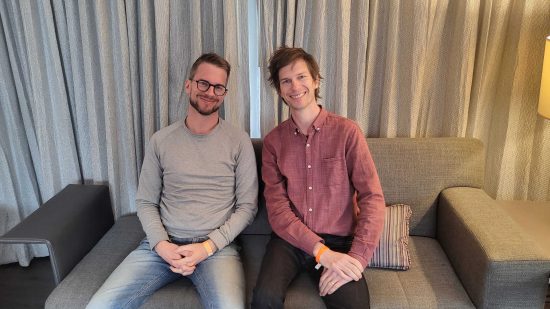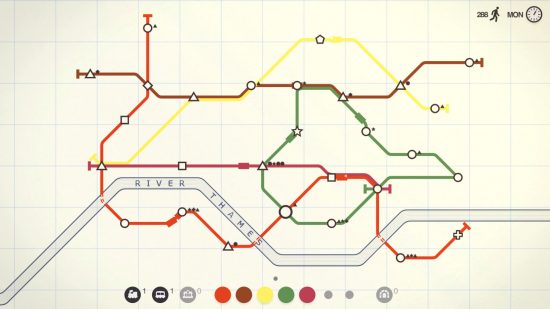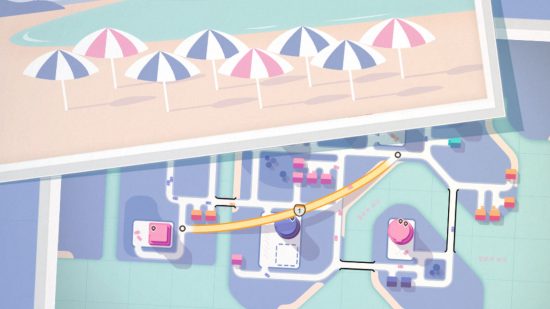It’s GDC 2023 this week, and we’re on the trade floor grabbing ten minutes with all the developers we can get our hands on. So, when we bumped into Rob and Peter Curry, the sibling founders of Dinosaur Polo Club, we eagerly asked if they might spare us the time to talk all things Mini Metro, Mini Motorways and beyond. Happily, they obliged.
If you don’t know, Dinosaur Polo Club is a New Zealand-based developer known for its aforementioned transport puzzle titles, Mini Metro and Mini Motorways. Matching minimalist visuals with deep puzzle gameplay, these games have not only spawned a legion of copycat titles, but they also inspire an online community of civil engineering enthusiasts eager to share their in-game creations. So, we started at the beginning and asked how the Mini concept came into being.
“There’s a few things that went into it. I really wanted to make games again as I still identified as a game developer, but I hadn’t released anything in five years” Peter told us before continuing, “so it was April 2016, and the pitch was minimalism, which worked really well with what we wanted to do. So we pitched ideas at each other for about an hour or so, and I had recently been to London, and I just really enjoyed having to get from A to B on the tube.”
This trip to London and the logistical effort that goes into navigating the London Underground cemented the concept of a metro-based puzzler, with the clarity and colour of various tube maps matching perfectly with the brothers’ minimalist intentions. Once all the elements were ready, it didn’t take long for the pair to figure out their core concept.

“It was honestly the easiest game we’ve ever designed. We designed it verbally in about half an hour. And that’s pretty much the same design as it is right now” is how Peter puts the development before the first incarnation of Mini Metro for a game jam contest. The game jam was a success too with Peter telling us that “every step of the way there were increasing levels of validation, so there was never any doubt there was going to be some success. Still, I think the level of success is more than we expected”.
The runaway success isn’t the only part of the Mini Metro explosion the Curry brothers weren’t anticipating. As we mentioned earlier, both Mini Metro and Mini Motorways have inspired plenty of online amateur civil engineers, with entire YouTube channels dedicated to getting the highest score on some of the most challenging maps across both games. We asked the developers whether they anticipated this sort of response or the coming together of a community of gamers.
It’s an honest “no” from Rob here before a laugh laced with humility. “It’s mostly accidental. I think we are putting even more thought into it in the games right now. But it’s a balance between fun and realism” the brothers explain, continuing, “the other happy accident from this is that people have often said that by playing our game, they can understand now why things are running late or whatever. They get some kind of empathy for people who have to organise these things as there’s a great deal to balance and that just because the bus is late, that might be just because there’s this other line was busy. So that’s been really cool that we’re actually able to build empathy and, yeah, into the world.”
If you’ve played any Mini Metro or Mini Motorways, you know that the game can go from zen-like puzzle fun to impossibly frustrating with just one wrong move, so we asked Rob and Peter how they’d describe the gameplay and received an answer we couldn’t agree with much more. “It’s predictable chaos,” they say, explaining how your limited agency over the drivers means you only have a certain level of control, putting more onus on creating routes that aren’t likely to cause delays.
Still, it’s fascinating that the developers are aware of what I call the ‘switch’ in Mini Metro and Mini Motorways when it turns from simple route building to something you feel you can barely control. “When things hit this crisis point, we think that it’s a key part of driving the game to a conclusion. Like every game needs to level with you and tell you it didn’t go well enough. And some people find that quite hard. But for us, it has to end somewhere,” Rob tells us, pointing to the unwinnable nature of the game that keeps so many players invested, though, apparently does scare a few off.
Of course, we couldn’t speak to the team at Dinosaur Polo Club without asking about the future of the Mini Metro and Mini Motorways, especially with the tenth anniversary of the former rapidly approaching. While the guys did the usual “we can’t say too much” routine that developers whip out like an FBI agent whips out their shiny badge, the brothers did say they plan to “celebrate the milestone appropriately” and hinted at some content in the works.
We did manage to prise confirmation from the pair that yet more maps are coming to Mini Motorways following the recent Busan update. Unfortunately, exactly where we can expect to go isn’t something Rob or Peter can share, but we did get a little insight into the process of picking a new location, with the pair telling us “we always we’re looking for new places. We do want to make sure that we don’t just sort of hit the main spots either, trying to focus on areas that might not get enough attention or where there are gaps in the world.”
In terms of the next game in the series, after politely teasing Rob and Peter about the alliterative nature of the series titles, we asked what we can expect to see from future Dinosaur Polo Club titles. Here, the pair were surprisingly forthcoming, telling us that they’ve stepped back slightly, handing over the reins of the next game to the “next generation of Dinosaur designers” while offering advice and support through the process.
What we took away from this chat with Rob and Peter from Dinosaur Polo Club is that creating a game isn’t all too different from creating a transport line. You can set it up with the best of intentions and have clear parameters on how to succeed, but the chaotic nature of all things steps in at some point. Fortunately for the developers, the online legion of civil engineers is the opposite of a delayed train, it’s given the Dinosaur Polo Club locomotive rocket boosters, and we’re only expecting more exciting things from the studio in the future.
For more deep dives alongside developers, check out our Yoko Taro interview for all things Nier, our Omega Strikers interview with Odyssey Interactive, and our Monument Valley interview retrospective with Ustwo Games.















